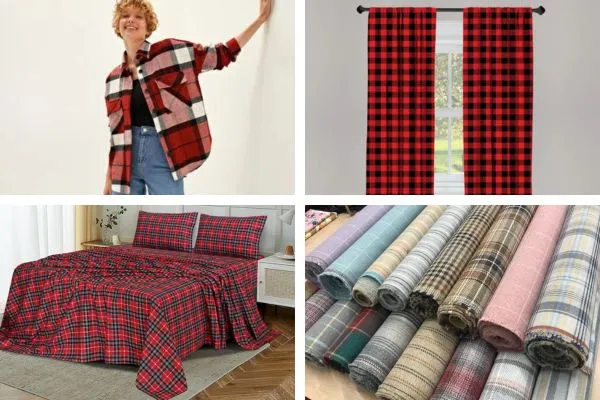Plaid fabric refers to the outer loose striped wood and variegated cloth. Mostly, highlanders used to wear this fabric. This plaid cloth was similar in length to tartan cloth. It also denotes the tailored and untailored garments worn about the shoulders.
In this article, we have added the properties, uses, and features along with the benefits that plaid fabric possesses. Have a look at the below!
Table of Contents
What is Plaid Fabric?
The plaid fabric is a type of checked pattern featuring colorful stripes intersecting each other. Plaid patterns are part of fabric weave and fabric print. The plaid fabric has its origin back in Scotland.
The primary usage is to refer to it as a garment. Plaid is a design available in both woven and printed versions. Plaid is synonymously used for tartan fabric. The tartan fabric has the culture to weave in a variety color of stripes using natural dyes.

What is Plaid Fabric made of?
Plaid fabric can be made of wool, cotton, and sometimes a blend of wool and cotton. To make casual shirts for men and skirts for girls, plaid is used. Plaid fabrics that are thick and made with woolen yarn are perfect for making warm jackets, and kilts.

The pattern of plaid makes a distinctive look. The plaid pattern consists of different colored stripes that intersect each other on the fabric. These stripes have a variety of strip widths. Plaid patterns feature color varieties. There is no specific plaid color set. It depends on several factors. For instance: The intended use of the fabric, fashion trends, and modern and traditional types.
Manufacturing Process of Plaid Fabric
Plaid fabric involves a meticulous manufacturing process. The process blends the traditional craftsmanship and the modern technological advancement. The process starts with the selection of the finest cotton fibers (to make cotton-made plaid fabric). Finest are required to ensure superior quality and durability. Fibers then get woven together. It results in intricate plaid patterns with a true testament to the textile production of artistry.
Plaid Fabric Properties
| Fabric Name | Plaid Fabric |
| Fabric Materials | Mainly Cotton, Wool, and Linen |
| Fabric Durability | Polyester Plaid fabric is durable |
| Fabric Breathability | High; the fabric is cool. |
| Moisture Wicking Ability | Cotton Plaid fabric has a high ability |
| Water Resistance Ability | High |
| Washing Temperature | 30 degrees Celsius maximum |
| Used for | Clothing, Home Textile, and Crafting, Sewing projects |
Plaid Fabric Characteristics
The plaid fabric has numerous features that make the fabric applicable for almost all seasons. Some of these characteristics are in the below:
- Distinct Pattern: Plaid fabric is a distinct patterned textile. It consists of intersecting stripes of both vertical and horizontal shapes. The fabric varies in terms of width and color. Other than that, the pattern of the plaid represents a checkered design. This checkered design enhances the visual appeal with various color combinations.
- Versatility: Plaid fabric has been popular till now because of its versatility. The fabric is a timeless choice in the area of fashion and design. Besides, the fabric has a classic pattern with variations and interpretations. Plaid design can be both simple and complex. The fabric is versatile also because of the variety of color combinations.
- Plaid as Fashion Statements: Plaid fabrics which are cotton-made, have a dominant presence in the industry of fashion. Plaid comes in great use in the creation of stylish shirts, dresses, cozy scarves, jackets, and all these. Plaid has the feature of adding a sophisticated touch and visual appeal to any outfit or crafting project.
Plaid Fabric Benefits
Plaid fabric comes with wide-ranging benefits. For instance:
- Plaid is durable, and wrinkle-resistant.
- The fabric is moth-resistant.
- It has poor air permeability.
- Age-reducing material
- Wearable in almost all seasons.
Plaid Fabric Used for
The plaid fabric is available to use in the following areas:
- Clothing: Shirts. Skirts, Blazers
- Home Textile: Bed sheets, Quilts, Curtains, Table clothes, Dust Cloth, Sofa Covers.
- Craft and Sewing projects

Plaid Fabric Care
Plaid fabric requires different ranges of care. For instance:
- For synthetic plaid, keep the temperature between 30 to 40 degrees Celsius.
- Always remember to keep the softness of the plaid intact.
- Wool or cotton-made plaid requires a desired cycle.
- A washing machine is preferable to wash the fabric at home.
Sewing Tips for Plaid Fabric
Here are some sewing tips for plaid fabric given in the following:
- Purchasing at least 25% of extra fabric is a blessing to match both stripes and checks.
- Choosing a simple pattern to match plaid lines and patterns.
- With big checks, you just need to match the checks. It is easy to match even like plaids.

Conclusion
The timeless fabric named plaid is more comfortable in the industry of upholstery and fashion. Plaid is a fabric that varies based on patterns, weaving patterns, visual appeal, and versatility. From ancient times to today, plaid cotton fabric has gone through a series of transformations. Because of this, plaid has now gained a position as the fashion statement around the world with a great means of identification and enriched history.

Mahedi Hasan working as an Executive (Fabric Marketing) at Pengnuo Group. Graduated with B.Sc. in Textile Engineering. Before was a Top Rated content writer at Upwork, and Level 02 Seller at Fiverr, Level 02 Publisher at Ezoic. Very passionate about content writing, SEO practice, and fashion website designing. Highly Experienced fashion writer for the last 4+ years. Have extensive 7 years of experience in the wholesale clothing business.
